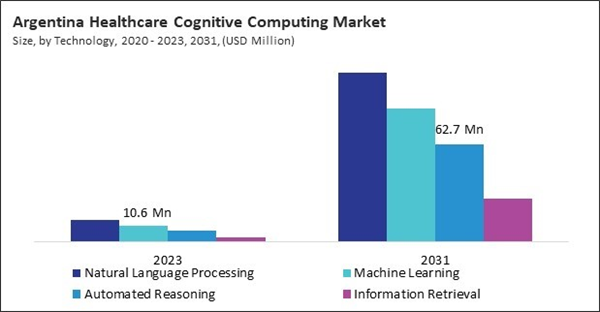The Brazil market dominated the LAMEA Healthcare Cognitive Computing Market by Country in 2023, and is expected to continue to be a dominant market till 2031; thereby, achieving a market value of $981 Million by 2031. The Argentina market is capturing a CAGR of 30.8% during 2024-2031. Additionally, the UAE market would register a CAGR of 27.9% during 2024-2031.
Cognitive computing automates routine administrative tasks such as claims processing, appointment scheduling, and resource management, improving operational efficiency and cost savings for healthcare organizations. By analyzing historical data and predicting future needs, cognitive computing helps healthcare providers allocate resources more effectively, reducing waste and improving patient care delivery.
Also, cognitive computing provides decision support systems that assist healthcare professionals in making informed clinical decisions. These systems analyze patient data, medical literature, and treatment guidelines to offer evidence-based recommendations. By providing additional insights and recommendations, cognitive computing helps reduce diagnostic errors and improve the overall quality of care, leading to increased adoption among healthcare providers.
As per the Government of South Africa, in 2022, the estimated population of South Africa will include more than five million people aged 60 or older. This represents a 9.2 percent share of the overall South African population. With an increasing number of elderly individuals, there is a rising need for telemedicine solutions in South Africa. Cognitive computing enhances telehealth platforms by providing AI-driven support for virtual consultations, essential for elderly patients with mobility issues or who prefer remote care. Cognitive computing technologies enable better access to specialist care for the elderly in South Africa through virtual platforms.
This helps overcome geographical barriers and provides timely medical expertise to those with limited access to healthcare facilities. Thus, the rising aging population and increasing digital adoption in the healthcare sector in the LAMEA region will lead to increased demand in the healthcare cognitive computing market.
List of Key Companies Profiled
- Microsoft Corporation
- IBM Corporation
- NVIDIA Corporation
- Intel Corporation
- GE HealthCare Technologies, Inc.
- Medtronic PLC
- Oracle Corporation
- Google LLC
- Cisco Systems, Inc.
- Amazon Web Services, Inc.
Market Report Segmentation
By Deployment
- Cloud
- On-Premise
By Technology
- Natural Language Processing
- Machine Learning
- Automated Reasoning
- Information Retrieval
By Country
- Brazil
- Argentina
- UAE
- Saudi Arabia
- South Africa
- Nigeria
- Rest of LAMEA
Table of Contents
Companies Mentioned
Some of the key companies profiled in this LAMEA Healthcare Cognitive Computing market report include:- Microsoft Corporation
- IBM Corporation
- NVIDIA Corporation
- Intel Corporation
- GE HealthCare Technologies, Inc.
- Medtronic PLC
- Oracle Corporation
- Google LLC
- Cisco Systems, Inc.
- Amazon Web Services, Inc.









